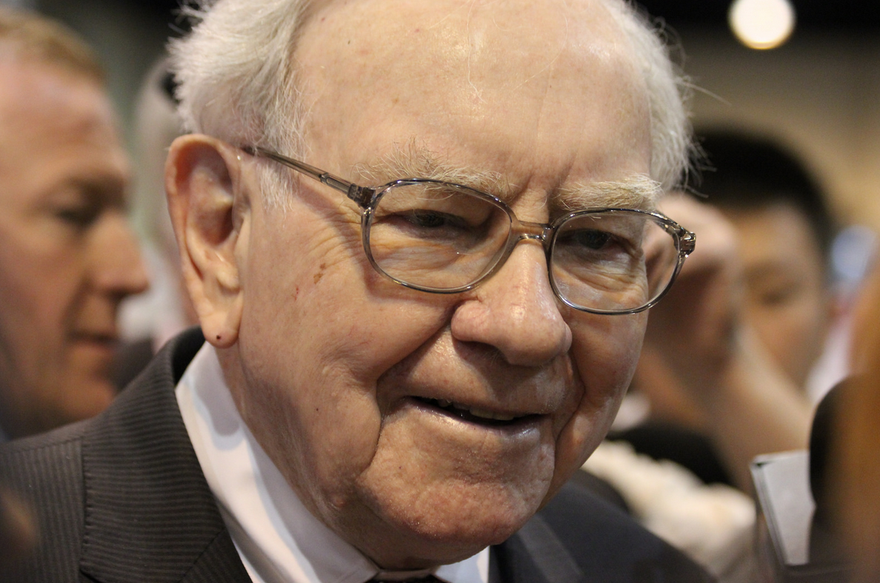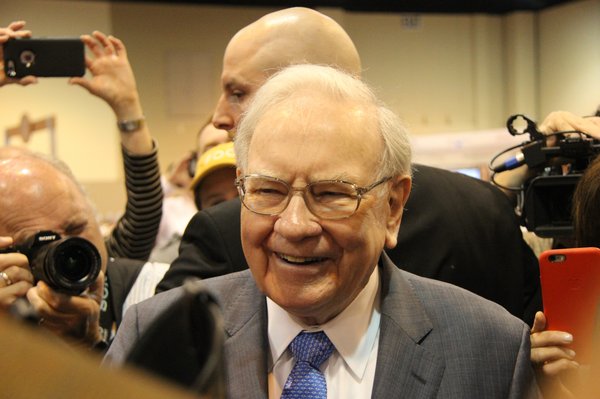If you want to invest like Warren Buffett, you don't need to do anything extraordinary.
In fact, many new investors are surprised at the uncomplicated investment style of the Oracle of Omaha. Buffett invests in great businesses trading for less than their intrinsic values and holds the investments for as long as they remain great businesses.
Of course, there's a little more to the story than that. In this article, we'll dig into Buffett's investment style. We'll provide some real-world examples of how he's implemented his investment philosophy and discuss the stocks he does (and doesn’t) invest in.

Investing philosophy
Warren Buffett's investing philosophy
As you might expect, much of Buffett's investment process is proprietary, so we don't know exactly how he researches investments. But here are some of the most important Buffett investing principles that you can incorporate into your own investing strategies:
Intrinsic Value
1. Look for a margin of safety.
In simple terms, a margin of safety refers to characteristics of an investment that help to protect investors from losing money.
For example, if a stock trades for $10 per share, but the company's assets are realistically worth $12 per share, that provides a margin of safety. The intrinsic value of the assets should prevent the company's stock price from falling too far. Or if it falls, the stock will become more attractive.
Buffett's goal is always to pay less than a company's intrinsic value.
2. Focus on quality.
Warren Buffett doesn't invest in junk. Early in his career, he would often focus on businesses that were in decline but still had some value. But this changed decades ago.
You typically won't see Buffett buying struggling businesses, regardless of how cheap they become. One of the best Buffett quotes new investors can absorb is, "It’s far better to buy a wonderful company at a fair price than a fair company at a wonderful price."
3. Don't follow the crowd.
Here's another piece of Buffett advice that is extremely important for beginner investors, especially in the modern age of Reddit message boards: Don't buy certain stocks just because everyone else is buying them. On the other hand, do not aim to always be a contrarian and sell the stocks that everyone else is buying.
As Buffett does, the best way to invest is to ignore the crowd entirely and focus on finding value on your own.
He also says, "The most important quality for an investor is temperament, not intellect. You need a temperament that neither derives great pleasure from being with the crowd or against the crowd."
4. Don't fear market crashes and corrections.
The obvious goal of stock investing is to buy low and sell high, but human nature can compel us to do the exact opposite.
Here's what I mean by that. When we see all of our friends and colleagues making money, that's when we feel like we should try to make money, too. So, we are tempted to put our money into stocks.
And when stock markets crash, it's our nature to wait it out on the sidelines. So, it's tempting to sell "before things get any worse."
Buffett loves it when stock prices drop since it creates opportunities to buy at a discount. This is why Buffett was extremely active in the stock market in the years immediately following the 2008-09 financial crisis.
Think of it this way: If you were shopping at your favorite store and suddenly learned that the entire store's prices were 20% lower, would you panic and run away? Of course not. Buffett embraces discounts on his favorite stocks. As he says, "Opportunities come infrequently. When it rains gold, put out the bucket, not the thimble."
5. Approach your investments with a long-term mindset.
One of the most important Warren Buffett quotes on investing that you can take in is, "If you aren't willing to own a stock for 10 years, don't even think about owning it for 10 minutes."
He doesn't choose stocks just because he thinks their prices are going to rise this week, this month, or even this year. Buffett buys stocks because he wants to own those businesses for the long term. To be clear, in practice Buffett sells stocks frequently, but he approaches most of his investments with the mindset of owning them forever.
It's also worth noting that if you can't get into a "forever" mentality with your stocks, Buffett argues one of the best investments most people can make is a set-it-and-forget-it investment such as an S&P 500 index fund.
6. Don't be afraid to sell if the scenario changes.
A famous Warren Buffett quote from when he was asked about an investment he decided to sell at a loss is, "The most important thing to do if you find yourself in a hole is to stop digging."
While he certainly wants to own every stock he buys forever, the reality is that outlooks change.
Here's a great example. It might surprise you to learn that Buffett bought a large position in mortgage agency Freddie Mac (FMCC 14.02%) a couple of decades ago. A few years before the financial crisis of 2008-09, he noticed the lender's management had started to take unnecessary risks with the company's capital and decided to sell. When the financial crisis hit, it became clear that Buffett had made a smart move.
7. Learn the basics of value investing.
Warren Buffett is widely considered to be the world's greatest value investor. Value investing prioritizes paying low prices for investments relative to their intrinsic values.
A value investor's goal is essentially to buy $100 worth of a company's stock for less than $100 -- ideally, much less.
Value investors seek out and invest in companies with intrinsic values that are well above the enterprise values implied by the prices at which the companies' stocks trade. Value investors like Buffett expect that the market will eventually recognize the full value of an undervalued company, resulting in an increase in the company's stock price and a profit for the value investor.
8. Understand compounding.
Warren Buffett is perhaps the best example of the power of long-term compounding.
Buffett uses compound interest, dividend reinvestment, and the power of constantly reinvesting the operating cash flow generated by Berkshire's businesses to his advantage. How powerful is this? Berkshire Hathaway (BRK.A -1.27%) (BRK.B 0.18%) has averaged a 19.9% annualized return from the time Buffett took over in 1964 through the end of 2024, compared with 10.4% for the S&P 500.
This may not sound too spectacular until you realize that, over time, this has resulted in a 5,502,284% total gain for shareholders versus 39,054% for the S&P 500.
9. Research and reflect.
Although he doesn't have quite the stamina or energy that he once did (he is in his mid-90s, after all), Buffett regularly spends long days in his office in Omaha, Neb.
It often surprises investors to learn that he spends the majority of his time just sitting alone and reading or not doing anything at all. He's been quoted as saying, "I insist on a lot of time being spent, almost every day, to just sit and think."
Buffett views knowledge as something that compounds over time, and he believes that much of his success can be attributed to the accumulation of as much investment knowledge as possible.
Stocks he invest in
Which stocks does Warren Buffett invest in?
The stock portfolio of Berkshire Hathaway is worth hundreds of billions of dollars, and most of the stocks were selected by Buffett himself. Although Berkshire's portfolio holds about 40 different stock positions, almost two-thirds of the portfolio's value is concentrated in just five stocks. Here's more information about each of these top holdings:
1. Apple (AAPL -2.51%)
The tech giant's stock is the largest holding in the Berkshire Hathaway portfolio, even after being trimmed significantly in recent years. Berkshire owns 2% of Apple’s stock, which was worth more than $61 billion as of mid-2025. Buffett loves Apple not only for its "sticky" customers -- it's tough to imagine a company with a more loyal customer base -- but also for its pricing power and top-notch leadership.
2. American Express (AXP -1.68%)
One of Berkshire's largest investments by percentage ownership, the company holds 21.6% of American Express stock -- worth about $46 billion at the time of this writing. Buffett has held its stock for more than 30 years. He loves the company's valuable brand and its role as both a payment network and lender in its transactions.
3. Coca-Cola (KO 1.42%)
Berkshire is a major investor in the beverage giant, owning 9.3% -- worth more than $28 billion at the time of this writing -- of the company's stock.
Buffett started accumulating Coca-Cola stock in the late 1980s, and it's been one of his most successful long-term investments. In addition to being a devoted customer, Buffett loves Coca-Cola's brand power and massive distribution network, both of which give it competitive advantages over would-be rivals.
4. Bank of America (BAC -3.5%)
Berkshire owns 8.4% of Bank of America's stock, and it was the company's second-largest bank stock investment as of mid-2025. This is an example of an investment that originated in a crisis, when Buffett tends to find his best opportunities. Even after selling quite a bit of the investment, Berkshire Hathaway's stake in the bank is worth more than five times what Buffett paid.
Buffett is a big fan of Bank of America CEO Brian Moynihan and the rest of the bank's management team. The company’s stock regularly trades for an implied valuation relative to the book value of its assets that is below its big-bank peers. Bank of America is also an excellent dividend stock, prioritizes share buybacks, and has grown at one of the fastest rates in its peer group in recent years.
5. Chevron (CVX -0.3%)
The newest addition of the top five, Buffett aggressively invested in Chevron in the 2022 bear market. The stake has been trimmed a bit, and Berkshire now owns 6.8% of the energy giant, a stake valued at about $17 billion in mid-2025. Berkshire also owns several major energy subsidiaries, so this ties in well with Buffett's affinity for the sector.
Related investing topics
Stocks he avoids
Which stocks does Warren Buffett avoid?
Buffett avoids investments he doesn't understand well. That's the main reason you won't find many high-growth technology companies or biotech stocks in Berkshire Hathaway's portfolio. They're not necessarily bad businesses or overvalued, but Buffett knows where his stock-picking strengths lie.
One final takeaway is that just because Buffett avoids a certain sector or industry doesn't mean that you also have to avoid it. You can invest like Buffett by sticking to what you understand.
FAQs
Warren Buffett strategy FAQ
Does Warren Buffett invest in cryptocurrency?
Warren Buffett does not invest in cryptocurrency. In fact, he has been rather outspoken about his lack of enthusiasm for the space and has warned investors against buying it.
How much did Warren Buffett invest in Apple?
It's impossible to know for sure what Berkshire Hathaway paid for Apple stock, since the investment was made over a period of years. We also have no idea how much Warren Buffett paid each time. But it is estimated that Buffett invested a total of about $40 billion in Apple, and the investment had a peak value of more than $150 billion before Berkshire started reducing its exposure.
What are Warren Buffett's five rules of investing?
Some of Warren Buffett's top rules of investing include (but are not limited to):
- Approach investing with a long-term mentality.
- Focus on buying wonderful businesses at fair prices.
- Hold your stocks for as long as they remain wonderful businesses.
- Look for bargains when most investors are panicking.
- Don't be afraid to sell if your investment thesis isn't working.







